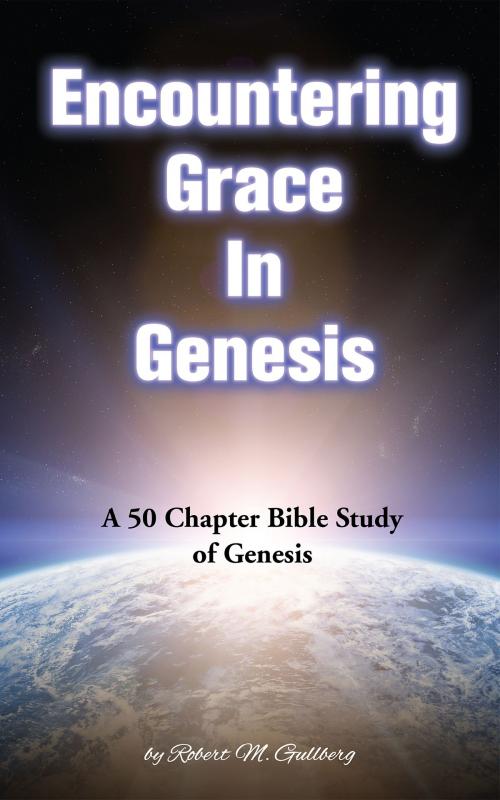Encountering Grace in Genesis
A 50 Chapter Bible Study On Genesis
Nonfiction, Religion & Spirituality, Bible & Bible Studies, Study, Old Testament| Author: | Robert M. Gullberg | ISBN: | 9781543919714 |
| Publisher: | BookBaby | Publication: | November 30, 2017 |
| Imprint: | BookBaby | Language: | English |
| Author: | Robert M. Gullberg |
| ISBN: | 9781543919714 |
| Publisher: | BookBaby |
| Publication: | November 30, 2017 |
| Imprint: | BookBaby |
| Language: | English |
Studying Genesis will answer many questions concerning life. Why are we here? What are our origins? How can we understand the world around us? What are the answers to these questions? When did evil begin? Why does suffering occur? How did civilization start? Why did God pick Abraham to start his nation? How does God work through ordinary people? How does God show us his grace, that is, his "undeserved favor"? The Bible confronts these questions and hundreds of others "head on" starting in Genesis, the first book of the Bible. Genesis is the first book in the Old Testament. It is the first book of the Pentateuch (Greek for "five scrolls"), penned by Moses, the famous Hebrew leader. In it, we are introduced to God, the masterful Creator. Regarding Moses, in John 5:46, Jesus Christ said, "If you believed Moses, you would believe me, for he wrote about me." This directly suggests to the hearer that Jesus is referring to himself as the God of the Pentateuch. The Pentateuch includes Genesis, Exodus, Leviticus, Numbers, and Deuteronomy. Jews call these same five books the Torah. Genesis has a timespan from creation to between 1700 and 1800 B.C. Early in the book of Genesis, we contemplate the mystery of the "fall" and redemption of man. We are amazed at God's regard for his creation. We learn quickly that the God of the Bible is a God of grace. He gives freely to us with unmerited favor and love. He loves us without conditions and wants the best for us. We see that he has been in the business of generating and making new his creation from the beginning of time. By his creation, I mean everything, every living and nonliving thing. It's in his nature to restore, regenerate, and transform nature and his people for the good. This is in spite of our "bend towards evil" as the Bible says in Genesis 8:21. When there is a break in the relationship, God wants and for the most part, chooses reconciliation. God has chosen to love his creation from the beginning. That is inherent in his nature. Creation and everything about it is his prize possession. Encountering Grace is a book about HOPE. It is a fresh look at God's redeeming grace—very evident throughout the 50 chapters of Genesis. Over the last 2000 years, since the physical appearance of Jesus Christ (God incarnate) on the planet earth, we've been living in the age of grace, when his church has been built, and the gates of hell cannot prevail against it. He continues to work amazing miracles in the hearts of people. He has sovereign control of the universe; from the bumble-bee buzzing over your head to the F4 hurricane brewing in the Caribbean, to the fate of a nation in peril. He has power over everything and the ability to regenerate all life, no matter what the circumstances. God wrote the Old and New Testament through men and women who were filled with his Spirit. Without this accurate, written record of history, the truth of God would slowly become more adulterated with the passing of each generation. If you are a believer, you believe that the Bible is inerrant in all its ways. It is our only true compass in life. All Christianity hinges on the accuracy of the Bible. Though written over a span of 1600 years by 40 different authors, we can find no discrepancy in its ageless truths. We trust that God breathed it into the hearts of its writers. "The grass withers, the flowers fade, but the Word of God stands forever" (Isaiah 40:8). Be encouraged by this book, as you will see God "love on us" throughout history. God fills us with hope continually through the pages of the Bible by restoring his people. Our God also shows us mercy and love. Though the earth we live in is filled with its share of tragedies, both on the individual and national levels, God has a plan way beyond what we can comprehend, because his perspective is eternal. He knows that on our own, we tend to mess up and turn away from him.
Studying Genesis will answer many questions concerning life. Why are we here? What are our origins? How can we understand the world around us? What are the answers to these questions? When did evil begin? Why does suffering occur? How did civilization start? Why did God pick Abraham to start his nation? How does God work through ordinary people? How does God show us his grace, that is, his "undeserved favor"? The Bible confronts these questions and hundreds of others "head on" starting in Genesis, the first book of the Bible. Genesis is the first book in the Old Testament. It is the first book of the Pentateuch (Greek for "five scrolls"), penned by Moses, the famous Hebrew leader. In it, we are introduced to God, the masterful Creator. Regarding Moses, in John 5:46, Jesus Christ said, "If you believed Moses, you would believe me, for he wrote about me." This directly suggests to the hearer that Jesus is referring to himself as the God of the Pentateuch. The Pentateuch includes Genesis, Exodus, Leviticus, Numbers, and Deuteronomy. Jews call these same five books the Torah. Genesis has a timespan from creation to between 1700 and 1800 B.C. Early in the book of Genesis, we contemplate the mystery of the "fall" and redemption of man. We are amazed at God's regard for his creation. We learn quickly that the God of the Bible is a God of grace. He gives freely to us with unmerited favor and love. He loves us without conditions and wants the best for us. We see that he has been in the business of generating and making new his creation from the beginning of time. By his creation, I mean everything, every living and nonliving thing. It's in his nature to restore, regenerate, and transform nature and his people for the good. This is in spite of our "bend towards evil" as the Bible says in Genesis 8:21. When there is a break in the relationship, God wants and for the most part, chooses reconciliation. God has chosen to love his creation from the beginning. That is inherent in his nature. Creation and everything about it is his prize possession. Encountering Grace is a book about HOPE. It is a fresh look at God's redeeming grace—very evident throughout the 50 chapters of Genesis. Over the last 2000 years, since the physical appearance of Jesus Christ (God incarnate) on the planet earth, we've been living in the age of grace, when his church has been built, and the gates of hell cannot prevail against it. He continues to work amazing miracles in the hearts of people. He has sovereign control of the universe; from the bumble-bee buzzing over your head to the F4 hurricane brewing in the Caribbean, to the fate of a nation in peril. He has power over everything and the ability to regenerate all life, no matter what the circumstances. God wrote the Old and New Testament through men and women who were filled with his Spirit. Without this accurate, written record of history, the truth of God would slowly become more adulterated with the passing of each generation. If you are a believer, you believe that the Bible is inerrant in all its ways. It is our only true compass in life. All Christianity hinges on the accuracy of the Bible. Though written over a span of 1600 years by 40 different authors, we can find no discrepancy in its ageless truths. We trust that God breathed it into the hearts of its writers. "The grass withers, the flowers fade, but the Word of God stands forever" (Isaiah 40:8). Be encouraged by this book, as you will see God "love on us" throughout history. God fills us with hope continually through the pages of the Bible by restoring his people. Our God also shows us mercy and love. Though the earth we live in is filled with its share of tragedies, both on the individual and national levels, God has a plan way beyond what we can comprehend, because his perspective is eternal. He knows that on our own, we tend to mess up and turn away from him.















